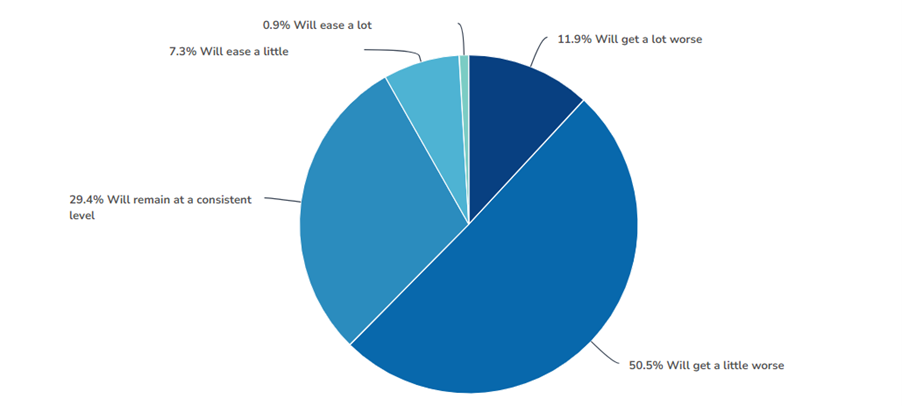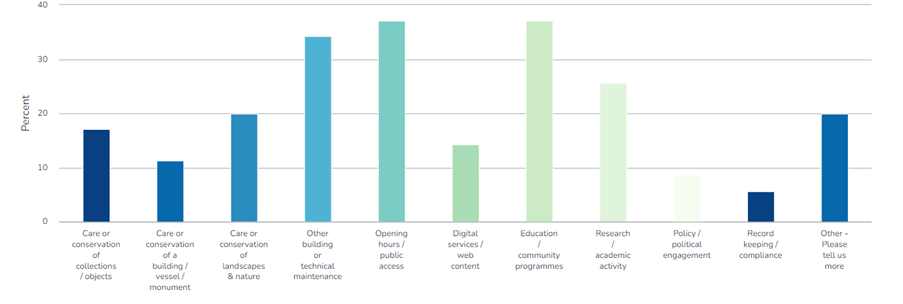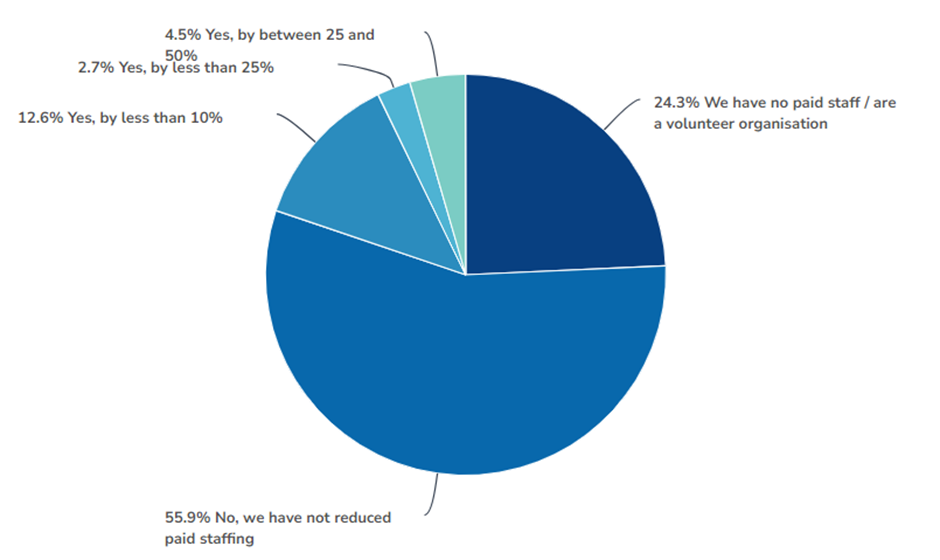Results from January 2024 Panel Research
In January 2024, 162 UK Heritage Pulse panel members responded to a survey which asked whether their organisation is currently experiencing costs or budget pressures.
The survey asked a series of questions which explored the extent of this impact, including any cuts or reductions they have been forced to implement or plan to implement to their programmes, services and facilities. The panel were also asked to consider whether they anticipate the pressures getting worse or improving in the future.
4 in 5 heritage organisations say they are currently facing budget pressures, particularly due to energy / utility costs and increases in supplier prices
78% of heritage organisations say they are currently facing budget pressures. The majority of those who are not facing budget pressures (22%) are smaller organisations, with low numbers of staff (or no staff at all) and a turnover of less than £50,000. They are mainly Historic Buildings & Monuments or Community Heritage organisations.
The 78% who are facing budget pressures were asked which of a series of options were the main source(s) of the budget pressures .The options which are impacting most organisations are: energy / utility costs (selected by 54% of organisations who are facing budget pressures), supplier prices (52%), maintenance and repairs (43%), insurance (38%) and payroll increases (36%). 29% said they are impacted by the National Living Wage increases.
“We are affected by severe flooding most years. This affects our insurance and the costs of repairing post-floods has increased significantly.”
Respondent
“Grant-funding allocated 2-3 years’ ago did not have inflation factored in, so working to budget that is not adequate to current costs.”
Respondent
“As private heritage owners, it is very difficult to get any sort of support financially to protect heritage.”
Respondent
The majority expect budget pressures to worsen in the next 12 months
Of those experiencing budget pressures, 62% believe the situation will get worse in the next year. Just over half (51%) believe that budget pressure they’re facing ‘will get a little worse’, while 12% of those believe it ‘will get a lot worse’. Just 8% agree that their situation will ease.
Looking ahead to the next 12 months, do you think your budget pressures will get worse or get better?
(n = 109)

64% of respondents from organisations with a turnover of under £1 million expect their budget pressures to get worse, while 55% of respondents from larger organisations (over £1 million annual turnover) expect their pressures to worsen.
Some panel members expanded on their responses, sharing the reasons they believe their financial situation will not improve:
“There has been a 9% rise in wages. We do not anticipate being able to increase the entry fee and shop prices to cover this amount so will have to find the money somewhere else – probably from money we had put aside for an upgrade of displays.”
Respondent
“We feel obliged to run another edition of our annual music festival because it’s the 30th, but if the Arts Council again refuses funding, it will use up all our reserves (and force us to make the 30th the last).”
Respondent
“Without a significant rise in visitor numbers and attendees at our events, we will not be able to raise our core funding required just to cover day-to-day costs, never mind the heating repairs.”
Respondent
The impact of budget pressures is yet to be fully felt, with organisations making more cuts to planned programmes, services, access and facilities
The 78% of the UK Heritage Pulse panel who are currently facing budget pressures shared the extent of the impact on their organisation’s programmes, services, access or facilities. 32% of them have already made cuts to existing programmes, services, access or facilities, with a greater proportion of larger organisations (a turnover of over 1 million) doing so (50%).
An even higher proportion of all respondents (57%) have begun decreasing their plans for the future. The areas in which organisations have already made the most significant cuts are: opening hours and public access (37%), Education and community programmes (37%), and building or technical maintenance (34%).
Has your organisation already cut or reduced any existing programmes, services, access or facilities due to budget pressures?
(n = 110)

Looking to the future, the areas in which organisations have delayed, cancelled or reduced any of their future planned programmes, services, access or facilities are: building or technical maintenance (47%), education / community programmes (34%) and digital services/web content (24%).
Has your organisation delayed, cancelled or reduced any planned programmes, services, access or facilities due to budget pressures?
(n = 109)

“[We have had to decide on a] postponement of maintenance until urgent.”
Respondent
“Increased costs, including staff’s cost of living increases, are forcing us to reduce what we do and/or charge more for services, which is difficult in the current climate.”
Respondent
“[We have] reduced opening days to the public and reduced staff hour), hence less interaction with the community groups.”
Respondent
The majority of organisations have not been forced to reduce their paid staffing, though 1 in 5 have.
The panel were asked whether their organisations have had to reduce paid staffing in the past 12 months due to budget pressure. Of those who have seen pressures, 56% said no. 24% do not have paid staff, or are solely a volunteer led organisation.
Has your organisation had to reduce paid staffing in the past 12 months due to budget pressures?
(n = 111)

Of the 20% who have reduced their staffing, this has mainly been done by freezing recruitment or not refilling roles (73%).
What other challenges are organisations facing?
A number of other themes arose from those who shared the biggest impacts on their organisations of budget pressures.
Some showed concern for staff welfare due to rising pressure, uncertainty and a decreased workforce:
“Increased staff anxiety”
Respondent
“Understaffing of front-of-house and back office teams leading to unreasonable workload for all.”
Respondent
“We have had to cut staff training and development leading to a large decrease in staff retention rate, affecting staff motivation.”
Respondent
Some organisations are using reserves to fill the gaps, and hoping that this will pay off in increased income in the coming year:
“Considering the use of reserves to cover budget gaps in coming financial planning. Greater anxiety over potential impact on the sector and our income over next year. Additional time scenario planning.”
Respondent
“We spent our reserves in setting up a bigger and better programme for 2024. Fingers crossed it works.”
Respondent
Some organisations are seeking additional funding to be able to deliver programmes where budgets have increased since funding was received:
“We reduced the outputs of a major programme due to cost of living pressures. We were intending to employ 10 staff but we reduced it to 9, we reduced the number of freelancers and spent time gaining additional match funding. Another project where the budget was developed 3 years ago is now in a poor state financially. We will need to request an uplift from the funder and contribute from our core funding to make it balanced.”
Respondent
How else are organisations coping?
Some expressed that being forced to improve their financial planning, although challenging, has increased transparency and had positive impacts across their organisation:
“We have a very clear understanding of our income/expenditure analysis. We have identified possible areas for future savings.”
Respondent
“Additional time spent on scenario planning is a positive despite being challenging.”
Respondent
“It has been useful to reflect on what we do and why and create a shared direction for change. Advice – where you need to make change take the positive path for the long-term however difficult, rather than a knee-jerk easier option.”
Respondent
Organisations are looking to diversify revenue streams and look for different sources of income:
“The situation forced us to diversify funding but also to ensure advance payments work harder through choice of interest paying accounts etc.”
Respondent
“New budgeting system which has helped prioritise activities. We are collaborating with partners/third parties more, and developing new opportunities once funding is found.”
Respondent
Finally, some organisations have been forced to get creative and try new things to cope with the current situation:
“Budget pressures help us to be innovative and creative. Pausing or delaying programmes meant we had time to focus on financial resilience.”
Respondent
“Get comfortable with the new normal and pivot as fast as you can.”
Respondent
“We have offered more free entry for children. And offered some primary schools to bring up to 10 children for a free visit which has encouraged them to make more paid visits. Set up more free event days which has slightly increased memberships. If it doesn’t cost you anything, let visitors come for free. They may make a donation, buy something or even buy a membership.”
Respondent
“Opening 5/7 days instead of 7 days a week has reduced seasonal staff costs – though also benefited in allowing time for more disruptive maintenance work that would usually be postponed until the winter closed season, and providing enticing public-free days for business/private events.”
Respondent
What is your reaction to these results? Please let us know at hello@insights-alliance.com, or share on social media with the hashtag #UKHeritagePulse


It is very worrying that 4 out of 5 heritage organisations are feeling budgetary pressures.
We urge organisations not to cut expenditure on utilising technology to drive commercial benefit through admission and event sales and all forms of secondary spend.
If you are at the ACE Conference next week, come and listen to my talk on using technology to grow online and gift shop revenues.